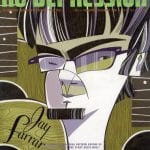Wayne Hancock – Hank done it this way
Williams, Sinatra, Roy Orbison, Glenn Miller, Carl Perkins; Hancock sounds like all of these great performers and like none of them. This is the fundamental truth and power of his music, and the single biggest distraction Hancock faces when recording. What to do when half a century of American music stands between you and your artistic vision? Most people make an earnest study of what came before, take what suits them and discard the rest. To Hancock, very little American music after 1960 is worth building from.
“Everybody thinks the ’60s were cool, but they forget about all the fucked-up shit. Everytime I hear that song ‘Eleanor Rigby’ I see Texas in a depression, kids bringing pineapple grenades to show-and-tell brought back by their brothers who served and lost their legs. Sad music. And then the ’70s — I don’t want to hurt anybody’s feelings so I won’t even go into the ’70s. Nothing worth a shit in the ’80s either except a little bit of country music.
“Mainly I liked my parents’ music and it’s music from a different era. My parents’ record collection extended from ’35 to ’55. Twenty years of music. Everything after that just didn’t jive with me, so I quit listening to the radio out of frustration in 1983 and haven’t listened since.”
Hancock’s musical isolation, much like his political, ideological and social isolation, stems from his unconventional background. His father, Robert Leslie Hancock, was an engineer by trade. He hopscotched the family around Texas to work on projects for Boeing, Lockheed-Martin and other government contractors, fighting the Cold War, after having fought in World War II and Korea.
Wayne Hancock was born May 1, 1965, when his father was 43. Wayne found little to relate to in his generation. While he was listening to his father speak with pride of having served in World War II, his friends’ brothers and uncles were being killed and maimed in Vietnam, a war that inspired mistrust and protest of the institutions the Hancocks held sacred.
“The hippies and peaceniks — I don’t have a lot of respect for those people, and it pissed the shit out of my father to see the flag that his buddies had died for be shit upon by these motherfuckers. I grew up with the same attitude and when I turned nineteen I joined the fucking Marines; two weeks out of high school. That was in June of ’84, same month my dad joined the Navy in ’41. He was 15 years old; he had somebody sign that they were his mother and went in under a false identity.
“He was a Frogman — what’s now known as the SEALS — and they would come up on the beaches before the landings and set landmines. He told me that he killed his first Japanese soldier when he was 16 years old. That really fucked with him. He would have nightmares of the war and would throw punches if you walked by him in his sleep.”
It didn’t take long for Hancock to realize he was ill-suited to military life. “Marines are tough, mean sonsabitches and I’m not like that. When I was a kid I thought I wanted to be a Marine and maybe die in a war and be a hero. Well that didn’t happen, luckily. When you’re young you think of stupid shit like that: glory.”
Without a visible enemy to fight, Hancock was miserable and got himself out of the Corps. Aimless, unfulfilled, sensing that he had disgraced the family legacy, Hancock tried to find some definition. He was married for three months (“I loved her, she was a great girl, but we had no business being married”) before he began wandering, taking odd jobs, briefly operating a tugboat in Florida, all the while idly filling spiral-bound notebooks with poignant country tunes.
One day, remembering the promise he had made to himself as a child, Hancock decided to go to Nashville and save country music. Country music, however, had no interest in his notion of salvation, and the Nashville guard added that Hancock, in their opinion, was not much of a musician.
“Nothing I ever tried to do ever worked out,” Hancock says. “Being a Marine didn’t work out. I tried working a tugboat in Florida; that didn’t work out. I tried being an alcoholic for a long time; that didn’t work out. I really needed this to work out. Then they told me I was nothing.”
After suffering a severe nervous breakdown, Hancock returned to Texas with the intention of re-enlisting in the Marine Corps at the start of the Gulf War. The Marines denied his request. Everywhere he went, the promise of glory that Hancock had been raised on closed itself off to him. All he had left, all he could think to do, he says, is pick up a bottle of whiskey, and hope for a quick death.
He nearly got his wish. One evening, as Hancock lay drunk and seriously ill in a Dallas motel room, a man was shot and killed in the room next door. Terrified, Hancock dropped to his knees and bore his soul to God.
“I told God that if he got me out of the fix I was in I would never again do it for the money, for the glory, or take the credit for getting there, ever. Instead I was going to do it ’cause it had to be done and nobody else is doing it.”




